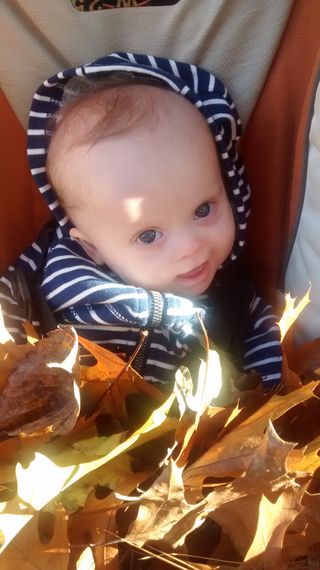Health
Literature and Down Syndrome: Finding Joy in the Present
How books can help cure our obsession with children's futures.
Posted November 5, 2018
This blog is about literature and what it can tell us about love: about how we can draw books into conversation with psychology to think about the art of love. The focus of this post is no different, but here I strike a more personal note than I have in other posts. I describe what it was like to receive a piece of life-changing news shortly before teaching “Love Stories,” the course that formed part of the inspiration for this blog. In this case, I think I that a narrative form, focused on two moments, best captures the point that I want to make, about how we can learn to live—and love—in the present.
Surprising News
I was in my campus office on a late October morning, going over my notes for Madame Bovary. Emma’s stark life always burdens my heart a bit, and no matter how much practice I have, the prospect of teaching anything to 250 students makes my stomach flutter. I love to teach, and I even like to lecture, once I’ve been talking for a minute or two, but it feels presumptuous to act as though I can say anything that more than a few people would really care to hear. At least it was Friday, a day focused on discussion instead of lecture.
I can be a nervous person, and on this morning, I also had a vaguer trepidation, over results for some routine prenatal tests which Laurel, my wife, had had and which we would hear about later in the day. Now and then it drew my mind from Flaubert’s passages. I’d stare at my walls of books or out the half-open window, trying to match my mood to the right angles of spines or the calm fall morning. At bottom, I knew, I did feel good. I was newly tenured at Brown. The class, “Love Stories,” was thriving. Our third child was on the way, and as Laurel reminded me, the other two had come to us without much trouble.
I was jotting down a note, about how Emma sees other people’s eyes, when Laurel called to say that our baby had a 9 out of 10 chance of having Down syndrome. We have two girls, but this one, she said through a sob, would be a boy.
This was at a quarter past nine. The jolt of it left us with little else to say, and by half past nine we’d said goodbye. I went ahead with my class at ten—why, I don’t really know, after this news that took our normal words. I held the class in a lecture hall far too large for us, so for discussion we used a catch-box, a microphone set in a cushioned orange cube that I threw to students. On most days, it gave the class a carnival feel. Today I short-armed a few of my microphone throws, and when students spoke I did what I could to listen, but my mind kept slipping through their words to Laurel’s, and to our changed world.
I don’t know how much the class noticed, at first, as I moved up and down the hall’s tiered aisles and thought the usual thoughts. What if our boy was the 1 out of 10, and didn’t have DS to begin with? (He wasn’t.) What if he was instead one of the 9, but miscarried? (In the fifteen frantic minutes between saying goodbye to Laurel and heading to class, I’d read of the strong chance that he would not make it to term.) What if he did make it? Who knew, maybe health problems that can result from DS could be treated more easily twenty years from now. Maybe our boy would be less likely to die, or develop Alzheimer’s, by the age of fifty.
And I thought of Laurel. Of how her voice broke when she said “it’s a boy”. Of how, when she asked about the child’s sex, the midwife asked Laurel if she really wanted to know. Of how, just before I left my office for class, Laurel messaged to me that our younger daughter, six days short of turning 3, had come with a cloth to wipe her mother’s tears.
Halfway through class I had a rhythm. I’d absorb the first few sentences that a student spoke and set them aside while they went on talking. This way my mind could stray where it wanted. I relived the hour before class. I went back to late summer, to wonder if our boy would still have the extra chromosome if we conceived him an hour before we did, or an hour after. Then I let my thoughts leap four decades forward. Trotting down an aisle, I considered what good could come for us, the year when he turned 40 and I turned 80.
Every so often I did manage to focus on the passages of Flaubert’s that I’d projected onto the screen over the stage, but even then, I could only read the book as being about our life. In one passage that we “discussed,” Flaubert contrasts Emma’s expectations for love with what love actually is when she falls for Leon Dupuis. She believes love ought to be obvious, “a hurricane from heaven that falls upon your life, turns it topsy-turvy.” This is not, Flaubert suggests, how the big things in life actually happen. He uses a devastating metaphor to suggest that we don’t notice something going on—even when it’s life-changing—until it is well underway: Emma “did not know that, on the foundation of a terrace of a house, the rain makes lakes when the gutters are blocked, and so she remained safe and secure, until suddenly she discovered a crack in the wall.” [1]
The passage is not about learning that your child probably has Down syndrome. It’s about how Emma falls for Leon without knowing it. Yet at that moment Flaubert seemed to be writing about us. Here we were, for more than two months blithely expecting an everyday baby, not noticing the water around our foundation until we could see a crack. Here we were, not seeing this major change in our lives even as the change took place.
A metaphor has never felt more real to me, and this one wasn’t even written with my situation in mind. I teach “Love Stories” for the same reason that I write this blog: because I believe in the power of books to better our lives and our loves. Books make us more empathetic. Books let us learn from characters’ lives without having to live them. Most of all, books give us vivid images, a wide range of colorful verbal frames that help us think of love as flexibly and as clearly as we can. In this, books help us to see that we can choose how we conceive of love. As I tossed my orange cube to students and failed to hear what they said, though, I had no choice. Emma’s life—and Flaubert’s metaphor for her—turned into mine.
The past and future flooded my thought. What if I could go back, before the rain made lakes? That crack in the wall—could it be fixed?
Learning to Love the Moment
This summer, I taught “Love Stories” again. I haven’t taught summer school before, but our boy did live, and though he’s only six months old, we want to start saving for him.
We don’t yet know the extent of Roland’s delays, or the health troubles he will have. We know only that he will have them, and that because of the extra chromosome, some are more likely than others. So far, he has been healthy—easier, if anything, than the girls were at the same stage. He’s been sleeping through the night since he was two months old. He doesn’t fuss very much, and our younger daughter calls him “Sir Roland, the Perfect Gentleman.” He does seem serene.
He also likes to smile. We might be imagining things, but to us Roland appears to struggle with it more than the girls did. We spend more time trying to meet his gaze. After a while it works, and his eyes start to simmer. You can sense that he wants to smile—the grin is in there—but for a while he can’t. When at last the smile breaks forth, it banishes my worries.
The last novel I teach in my class, Hurston’s Their Eyes Were Watching God, tells of how love can free us from fear. It’s one of my favorite books, and it portrays the love between Janie Crawford and a character known to everyone as Tea Cake. At his urging, Janie moves from Georgia to Florida, and before long they get caught in a hurricane—not some hurricane of romantic fantasy, this time, but the deadly storm that swept across Lake Okeechobee.
Amid the disaster, Tea Cake asks Janie whether she still would have come with him, if she had the chance to go back and live again. Janie tells her husband that she wouldn’t change anything. “We been tuhgether round two years,” she says, and “[i]f you kin see de light at daybreak, you don’t keer if you die at dusk. It’s so many people never seen de light at all. Ah wuz fumblin’ round and God opened de door.” [2]
Tea Cake’s love is the light that Janie saw at daybreak, and this moment says so much about love’s power: to keep us from the fear of death; to keep us from wishing we could change the past and from fretting too much about the future; to feel instead that we’ve lived a full life. Teaching the novel this July, I felt again what I felt the October before, only now it was Hurston writing about us even as she wasn’t.
The hurricane we expected, so far, has not come to our still shore. Hurston’s words don’t fit perfectly. But we do have the sense, at times overwhelming, that maybe you don’t need a long life to live a full life, that maybe what makes a full life is a full love. When God opens the door and Tea Cake appears, Janie has this sense of fullness. When Roland smiles at one of us, we have the same thing. I have seen the glory of that smile. I have seen my daughters care for their brother. I have seen, above all the rest, how tender Laurel has been with him.
I have seen the light at daybreak.
In “Auguries of Innocence,” Blake writes of what it might be like to find everything in something small, to forget about the past and future and dwell in the moment. We yearn
To see a World in a Grain of Sand
And a Heaven in a Wild Flower
Hold Infinity in the palm of your hand
And Eternity in an hour
Laurel and I don’t think much, anymore, about what might happen were we to return to last August. We do think about Roland’s future, and our thoughts can be both hopeful and melancholy as we wonder what to expect.
And yet. When that little boy lights up, there is no time except the present. Eternity is right there, hiding in his smile.

What Makes a Life Worth Living?
I’ve related these moments partly because I think that it helps shed some light on how we deem a life worth living. Debates about Down syndrome take many forms, but often they focus on the future: on what a child with DS (or the parent of a child with DS) can expect, and on what the future of therapy for those with DS might look like. Illustrative in this regard is a well-known disagreement between Peter Singer and Michael Berubé.
In Rethinking Life and Death, Singer defends an argument—not just for abortion, actually, but for infanticide—partly on the grounds of the future. To justify his argument, Singer himself turns, however vaguely, to literature. He remarks that “Shakespeare once described life as an uncertain voyage,” and claims that if a child has a disability such as DS, the uncertainty of the future might be too much: “[b]oth for the sake of ‘our children’, then, and for our own sake,” Singer writes, “we may not want a child to start on life’s uncertain voyage if the prospects are clouded.” If we don’t like where a child’s voyage seems headed, perhaps it’s best to stop the voyage right now. In an oft-quoted passage, Singer contends that
“To have a child with Down syndrome is to have a very different experience from having a normal child. It can still be a warm and loving experience, but we must have lowered expectations of our child’s ability. We cannot expect a child with Down syndrome to play the guitar, to develop an appreciation of science fiction, to learn a foreign language, to chat with us about the latest Woody Allen movie, or to be a respectable athlete, basketballer or tennis player.” [3]
When Berubé takes issue with Singer, he also focuses on the future. Berubé’s argument is that we really don’t know what the future of DS holds, except that that future is rapidly improving. When we can, we should avoid making assumptions about reasonable expectations:
“we cannot (I use the term advisedly) know what to expect of children with Down syndrome. Early-intervention programs have made such dramatic differences in their lives over the past few decades that we simply do not know what the range of functioning looks like, and therefore do not rightly know what to expect. That, Professor Singer, is the real challenge of being a parent of a child with Down syndrome: it’s not just a matter of contesting other people’s low expectations of your child, it’s a matter of recalibrating your own expectations time and time again—and not only for your own child, but for Down syndrome itself.” [4]
Arguments like the one between Singer and Berubé are vital to how we regard Down syndrome. Prospects for those with DS (and their parents) have improved, and will improve, in ways that we can’t yet anticipate. In other words: yes, the prospects are clouded, but in some ways that’s a good thing.
While I agree with Berubé, I relayed this story of mine, and focused in on two moments of it, because I also think that we don’t need to look only to the future to justify the value of life. I don’t care if Roland becomes a Woody Allen fan or a skilled basketball player. I don’t need to obsess about either his prospects or the future of DS therapy, as I did on that late October morning a year ago. I don’t need to always conceive of Roland’s life as a voyage, the veiled end of which I need to try to see. I can also dwell on his present: on the light at his daybreak. So much of the literature of self-help aims to help us learn how to live and to love in the moment, and for those with Down syndrome, it should be no different.
References
[1] Gustave Flaubert, Madame Bovary, trans. Adam Thorpe (New York: Modern Library 2013), 119.
[2] Zora Neale Hurston, Their Eyes Were Watching God (New York: Harper, 2013, 159-160.
[3] Peter Singer, Rethinking Life and Death: The Collapse of Our Traditional Ethics (New York: St. Martin’s Press, 1994), 212-214)
[4] Michael Berube, “More on Peter Singer and Jamie Berube,” http://www.michaelberube.com/index.php/weblog/more_on_peter_singer_and_…)




